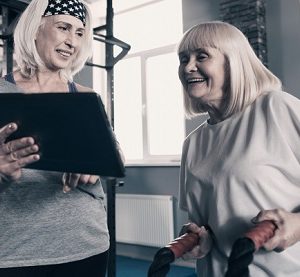Three (3) Essential Tips for Healthy Aging From Infofit
Three tips to age healthy
In our contemporary North American society, aging is generally considered to be a painful, unpleasant and generally undesirable experience. We do it because the alternative—death—is similarly undesirable. As a society, we are willing to try nearly anything to avoid getting old: creams, diets, drugs, cosmetic surgery, and more. And with the plethora of ‘solutions’ out there, it is nearly impossible to know where to turn or who to trust.
In this article, I will outline three ways for healthy aging that can get you started today in not only slowing down the aging process, but improving your body and health in nearly every respect: appearance, strength, and energy. At Infofit educators, we advance only the most legitimate and scientifically supported theories and methods, and it is this education that transforms lives and elevates our students and elite personal trainers to the top of the fitness and health industries.
So, let’s get started!
Healthy Aging Tip #1 – Drink up!
You hear it all the time: drink more water. But do you do it? Let this be yet another friendly reminder to drink some water right now. Water is seriously magical; its cost is infinitesimal, yet its benefits are infinite. For one thing, healthy levels of hydration will improve your kidney function, as a dehydrated body will produce more highly-concentrated urine, and concentrated urine is like sandpaper for your kidneys: it stresses them out and demands way more energy to process. Water also thins out your blood—and while this may sound scary and to be avoided, most doctors would agree that when it comes to blood, the thinner, the better. Thick blood is more likely to carry the toxins, bacteria, and excess glucose and insulin which leads to heart disease and inflammation—and inflammation is always to be avoided, whether your goal is aesthetic, physical, or mental. So, stay hydrated to maximize your body’s potential for healthy aging!
Healthy Aging Tip #2 – Don’t overdo your cardio
I am not telling you to hang up your Asics and never jog again for as long as you live. Certainly, we at Infofit Educators promote in our teaching the benefits of cardiovascular conditioning to our students and elite personal trainers (You can check out our article on correct training for endurance running); when done regularly (and effectively), cardio workouts have been shown to increase heart strength and lung capacity. And if you are looking to introduce physical activity into an otherwise sedentary lifestyle, cardio can provide a great starting point. But recently, experts in the fields of fitness and exercise science have begun to change their tune when it comes to cardiovascular conditioning. Quite simply, cardio is not seen as universally essential for healthy aging as it once was.
Healthy aging is dependent on many factors. Each body is different and will react to different stressors, but recent studies have shown that there does exist a limit to cardio’s benefits, after which point, the effects are minimal (or even detrimental). Though most exercise does create some amount of cortisol, excessive cardio creates more than the body can effectively clear away, thus making you more tired and stressed out and negatively impacting your energy levels, your hormones, and your sleep—which are essential for healthy aging and the maintenance of a strong body.
And if you are performing high volumes of cardio, and/or maintaining an extreme caloric deficit, any weight that you lose is much more likely to come from muscle, rather than fat. And you definitely want to hold onto the muscle that you have; for not only is muscle more metabolically efficient than fat (meaning that it burns more calories, thus allowing you to eat more without gaining fat), it also helps to preserve your bone density. Plus, it looks good! Without taking the necessary preventative measures (which will be outlined in the next point), you will lose muscle as you get older. This phenomenon is referred to as sarcopenia; some experts argue that after the age of 30, a body can lose as much as 10% of its muscle mass per decade. And the weight that you’ve lost in muscle is often replaced by fat!
So, what exercise do we at Infofit recommend for healthy aging if you want to maintain muscle, burn fat, and generally look and feel great well into your senior years?
Healthy Aging Tip #3 – Lift, lift, lift
If you guessed strength-training, you are 100% correct! At Infofit educators, we believe wholeheartedly in the absolute necessity of strength training for any body at any level—for the young, for the old, for the couch potato, and for the elite personal trainer. And this philosophy is supported by the general consensus of fitness and health experts. If you want to slow down the aging process, look your best, and live a life of vigour and strength, you must strength-train; there is no way around it. The muscle degeneration that comes with age can only be delayed or reversed with a regular strength-training program. The good news is that no matter how old you are, you can maintain and grow muscle!
And not only has strength training been shown to improve physical performance and health, studies have also discovered a promising correlation between strength-training and brain function. One trial led by the University of Sydney found that muscle-strengthening programs led to improved function in the brains of adults with Mild Cognitive Impairment (MCI). Multiple studies have found that strength-training builds new neural pathways, enlarges your memory centre and improves IQ scores. So, if you think that your brain can’t be changed, and that your cognitive function—or lack thereof—is predetermined and inevitable, think again! And lift again!
Not Convinced Yet?
Not convinced yet? Don’t discount the positive effects that weight-training will have on your posture, your body size and shape, your motivation, and your general mood and well-being. If you are confused as to how to even begin strength-training, consider a course or program that can offer you the motivation, skills, and knowledge necessary for creating safe and effective weight-training programs; Infofit educators offer a wide array of courses that fit your lifestyle and needs and which will absolutely change your life for the better. For more information on our courses and training programs visit infofit.ca . We also offer tons of helpful blog posts, articles, and videos that will help to get you started on your fitness journey.
-
 ACE Functional Aging Specialist$418.95
ACE Functional Aging Specialist$418.95 -
 ACE Functional Aging Group Exercise Specialist$418.95
ACE Functional Aging Group Exercise Specialist$418.95 -
 Training the Aging Population$288.75 – $519.75
Training the Aging Population$288.75 – $519.75

